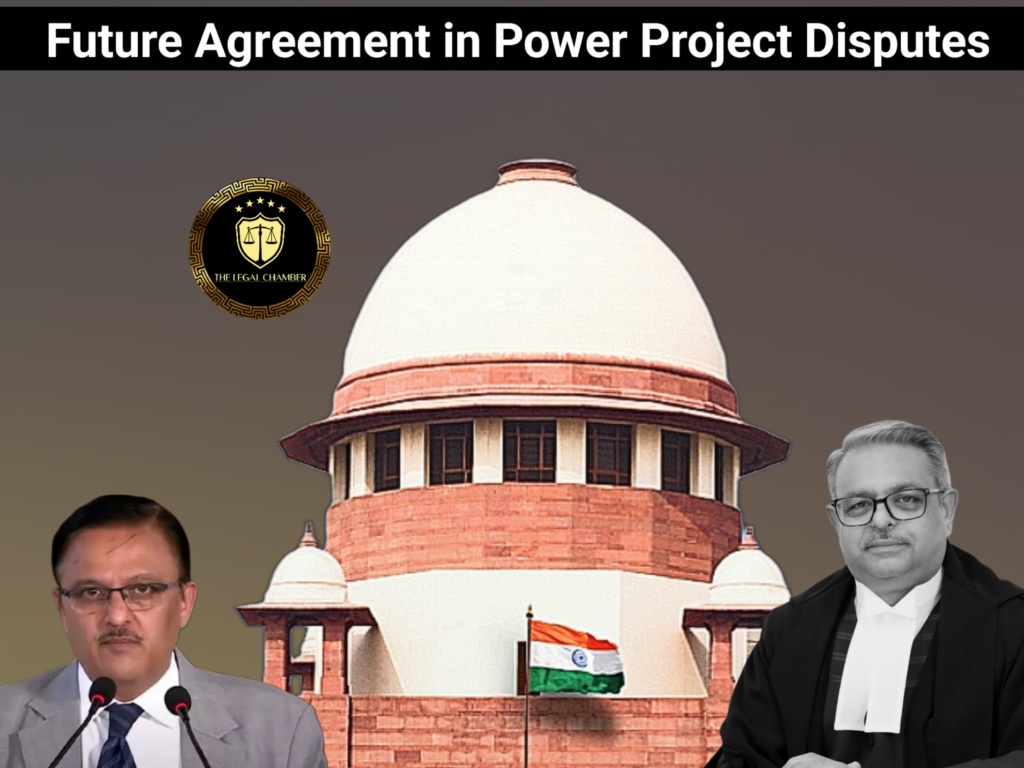
The Supreme Court upheld the doctrine of privity of contract, ruling that Brua Hydrowatt Pvt. Ltd. (BHP) was solely liable for transmission bay costs under its agreement with HP Power Transmission Corporation (HPPTC), despite internal arrangements with third parties. The Court held that non-signatories (Respondent Nos. 2 & 3) could not be bound by the contract, reversing APTEL’s order. The judgment reaffirmed that contractual obligations apply only to parties to the agreement, unless explicitly extended.
Facts Of The Case:
The dispute arose between HP Power Transmission Corporation Ltd. (HPPTC) and M/s Brua Hydrowatt Pvt. Ltd. (BHP) over the liability for construction and maintenance costs of a 66kV power transmission bay at Urni, Himachal Pradesh. BHP, along with two other power companies (Darjeeling Power Pvt. Ltd. and Roura Non-Conventional Energy Pvt. Ltd.), had entered into an Internal Tripartite Agreement (ITA, 2019) to share costs proportionately for the bay. However, BHP alone signed a Connection Agreement (CA, 2021) with HPPTC, making it the sole “applicant” responsible for payments. When HPPTC demanded the full cost from BHP, the latter argued that liability should be shared as per the ITA.
The Himachal Pradesh Electricity Regulatory Commission (HPERC) ruled in favor of HPPTC, holding BHP fully liable under the CA. On appeal, the Appellate Tribunal for Electricity (APTEL) reversed the decision, directing HPPTC to recover costs proportionately from all three companies. The Supreme Court overturned APTEL’s order, emphasizing privity of contract—since only BHP was a party to the CA, it alone was liable, and HPPTC could not enforce the ITA against non-signatories. The Court restored HPERC’s decision, clarifying that internal agreements between third parties do not alter contractual obligations under the principal agreement.
Procedural History:
The case originated before the Himachal Pradesh Electricity Regulatory Commission (HPERC), where Brua Hydrowatt Pvt. Ltd. (BHP) challenged HP Power Transmission Corporation Ltd. (HPPTC)‘s demand for full payment of transmission bay costs under their Connection Agreement (2021). HPERC ruled in favor of HPPTC, holding BHP solely liable. Dissatisfied, BHP appealed to the Appellate Tribunal for Electricity (APTEL), which reversed HPERC’s decision, directing HPPTC to recover costs proportionately from all three power companies involved. HPPTC then approached the Supreme Court, arguing that APTEL erred in disregarding the privity of contract. The Supreme Court upheld HPERC’s initial ruling, setting aside APTEL’s judgment and reaffirming that BHP, as the sole signatory to the agreement, bore exclusive liability. The procedural journey thus saw two reversals—first by APTEL and finally by the Supreme Court—before settling the dispute in HPPTC’s favor.
Court Observation:
The Supreme Court made several key observations while delivering its judgment. It emphasized the doctrine of privity of contract, noting that only parties to an agreement can be bound by its terms. The Court observed that while BHP had internal arrangements with other companies under the Tripartite Agreement (2019), HPPTC could not enforce this against non-signatories since it was not a party to that agreement.
The Court further held that the Connection Agreement (2021) clearly designated BHP as the sole entity responsible for payments, and the absence of explicit terms allowing HPPTC to recover costs from third parties was decisive. It criticized APTEL for misinterpreting contractual obligations by introducing shared liability where none existed under the principal agreement.
Additionally, the Court highlighted that contractual clarity and strict interpretation must prevail, ensuring that commercial agreements are enforced as written, without imposing obligations on unrelated parties. It reinforced that internal agreements between some parties cannot override the express terms of a separate contract to which they are not privy. Ultimately, the Court restored the HPERC’s decision, affirming that BHP alone was liable under the Connection Agreement.
Final Decision & Judgement:
The Supreme Court allowed the appeal filed by HP Power Transmission Corporation Ltd. (HPPTC) and set aside the Appellate Tribunal for Electricity’s (APTEL) judgment, thereby restoring the original order of the Himachal Pradesh Electricity Regulatory Commission (HPERC). The Court held that M/s Brua Hydrowatt Pvt. Ltd. (BHP) was solely liable for the transmission bay costs under the Connection Agreement (2021), as it was the only signatory to the contract with HPPTC. The bench categorically rejected the argument that liability could be split among non-signatory companies based on the Internal Tripartite Agreement (2019), reaffirming the foundational contract law principle that a contract cannot bind non-parties. The Court ruled that HPPTC had no legal basis to recover payments directly from the other two power companies (Darjeeling Power and Roura Energy) since they were not parties to the Connection Agreement. The judgment reinforced strict contractual interpretation and the doctrine of privity, ensuring commercial certainty in power purchase agreements. No costs were awarded, and all pending applications, if any, were disposed of accordingly.
Case Details:
Case Title: HP Power Transmission Corporation Ltd. vs. M/s Brua Hydrowatt Pvt. Ltd. & Ors. Citation: 2025 INSC 680 (Supreme Court of India) Appeal Number: Civil Appeal No. 3919 of 2023 Date of Judgment: May 14, 2025 Bench: Justice Abhay S. Oka & Justice Augustine George Masih
Download The Judgement Here